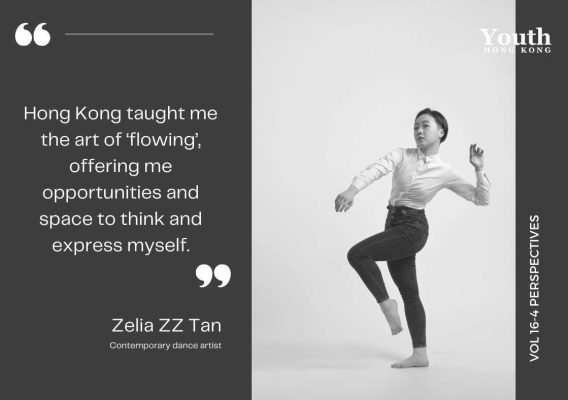//16.4 Perspectives
Zelia ZZ Tan, a contemporary dance artist and experimental dance film director, talks about the diverse opportunities Hong Kong offers her.
Zelia, now pursuing a master’s degree at the California Institute of the Arts, was originally drawn to the International Style of Ballroom Dancing, a highly formalised and competitive dance form. However, looking for a more diverse dance environment, she left Guangzhou at 16 to study contemporary dance at the Hong Kong Academy for Performing Arts (HKAPA).
After ten years of studying and working in Hong Kong, Zelia now considers the city to be a crucial part of her dance journey, not only professionally but personally. Here, she was able to live independently and gain exposure to a wider world. She also managed to find a community of friends after overcoming language and culture barriers. “To me,” as she describes, “Hong Kong feels like a long-lost hometown.”
“This city taught me the art of ‘flowing’, offering me opportunities and space to think and express myself. I felt homesick for Hong Kong when I went on to study as an exchange student in the UK. This city is my lighthouse, guiding me when I feel adrift in the middle of an ocean.”
Dance for Zelia is a medium of expression and self-exploration, and contemporary dance is where various cultures and ideas, old and new, traditional and non-traditional, come together. “Dance is a powerful language. It lets me step out into the world. Through artistic creations in dance, I find ways to push beyond my limits. Contemporary dance is a genre rich with dialogues and possibilities, where so many themes and perspectives can be explored.”
However, this self-exploratory journey is not without its challenges. As well as getting injured, Zelia has found dancing a difficult way to make a living. As she describes it, “Some dancers become freelancers after graduation, running here and there to perform and teach. In a fast-paced city like Hong Kong, our status feels unstable and it feels difficult to empty one’s mind in order to perform creatively, especially when stepping onto a stage that is completely dark.”
Zelia is grateful for all her opportunities in Hong Kong but she points to the small dance communities in the city, especially in cross-disciplinary dance. She also laments the fact that there are fewer exhibitions, arts festivals and projects here compared to Europe.
“When I finish my degree in the US, I may return to Hong Kong to teach. First I want to focus on creating new work and polishing my skills. The decision to leave or stay in a city is never an easy one. Choosing an unknown path always requires courage.”
“I would like to see more long-term projects in the interdisciplinary field of dance and technology in Hong Kong, perhaps collaborations with game companies and students to expand the dance community, as well as more cultural channels and curators to create further opportunities for artists.”
For Hong Kong to become more attractive to artists, Zelia believes that the government must be more supportive, yet community support is equally important. Bringing together emerging and experienced artists in different countries through community events is even more critical. ■


